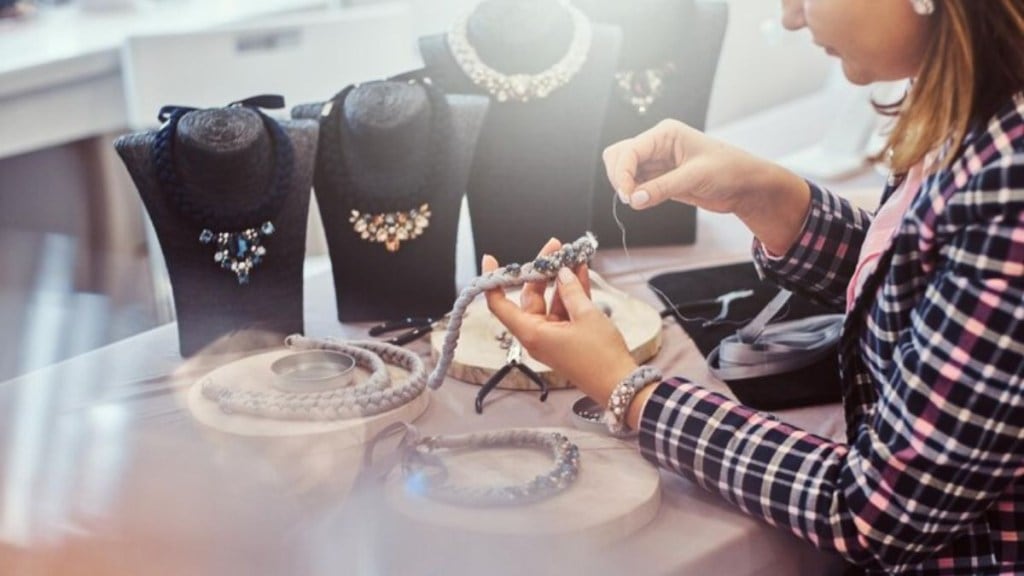The Tanishq showroom on Turner Road in Bandra, Mumbai has been gearing up for the upcoming festive season. It’s a weekend and there is a steady stream of visitors looking for jewellery for Ganesh Chathurthi and Onam, which will be celebrated this month.
While the Tata-owned showroom is a clear draw amid the line of jewellers on Turner Road, there is equal action happening at the neighbouring Kalyan Jewellers’ outlet on Waterfield Road. People are lining up to catch a glimpse of the festive collections.
At 8-9% in terms of market share and 975 showrooms, the jewellery division of Titan, part of the Tata group and led by brands Tanishq, Zoya, Mia and CaratLane, remains the clear leader in the organised jewellery market.
But rivals, mostly regional players, are snapping at its heels, entering new markets, launching new products and standardising service. Much of these strategies have been used successfully over the last three decades by Tanishq, Titan’s flagship jewellery brand, to carve a niche for itself in a market that has about 64-65% controlled by unorganised players. Rivals though are taking cues from Tanishq’s marketing manual to grow share as the shift happens from unorganised to organised.
Titan says that it is fighting back, and will increase its marketing spends, continue to excite consumers with new and vibrant collections, remain competitive with buyback and exchange programmes and launch more stores across the country, mainly in smaller towns and cities.
“Competitive intensity has increased amongst existing players and newer players are also getting in. But having said that, the organised jewellery market is growing and there is room for all,” says Ajoy Chawla, chief executive officer, jewellery division, Titan.
In July, Aditya Birla Group announced the launch of its jewellery brand Indriya under its Novel Jewels venture, with four stores to be opened in Delhi, Indore, and Jaipur and plans to expand to over 10 cities in six months. The group has committed `5,000 crore in terms of investment for the jewellery venture over the next five years and considers Indriya to be a natural extension to its fashion and lifestyle business. Last week, Reliance Retail’s executive director Isha Ambani unveiled plans to enter the luxury jewellery segment to cater to affluent consumers. These players, say experts, could upend the market, as the organised segment gets crowded and consumers seek novelty.
At `6.7 lakh crore in terms of overall value, the total jewellery market in India is estimated to double to `11-13 lakh crore by 2030, thanks to rapid formalisation, according to a report by brokerage house Motilal Oswal.
The share of the organised market within the total jewellery market has been growing, Motilal Oswal says, touching 36-38% now, versus 20-22% in terms of share five years ago. The organised segment has also seen an 18–19% revenue growth over the last five years, with leading players such as Titan, Kalyan, and Senco collectively achieving a 20% revenue growth during the period, according to the brokerage.
Though the June quarter of FY25 has been challenging for jewellery brands due to high gold prices, elections and limited wedding days, most players including Titan, Kalyan and Senco as well as the unlisted Joyalukkas remain confident of the second half of the current fiscal, saying that sales growth will be strong, led by the festive season.
Experts say that the need for trusted names in a market like jewellery, the ever-booming wedding market and brands that combine design with aesthetics at competitive prices is driving the organised market.
Kalyan Jewellers, the Kerala-based jewellery company, for instance, aims to launch over 130 new stores in FY25, including about 40 Kalyan outlets in India, nearly 30 Candere showrooms and the first US store by Diwali, it said about its plans for the current fiscal.
The West-Bengal-based Senco Gold and Diamonds is planning to open about 18-20 new stores in FY25, Suvankar Sen, MD and CEO of the company, said. This will include 10-12 company-owned outlets and around 8-10 franchisee stores, with the sales growth rate this year estimated at around 18-20% versus the previous year.
“A lot of the old gold exchanged at our outlets, for instance, is coming from non-Senco customers. This speaks of the formalisation trend happening in the market. Consumers are seeking organised retailers,” Sen said.
Joyalukkas, another Kerala-based jeweller, plans to launch 60 new stores in the next three years, largely outside the southern markets of India. While Malabar Gold and Diamonds, also based in Kerala, will add 100 new stores this financial year (FY25), MP Ahammed, chairman of Malabar Group, added.
